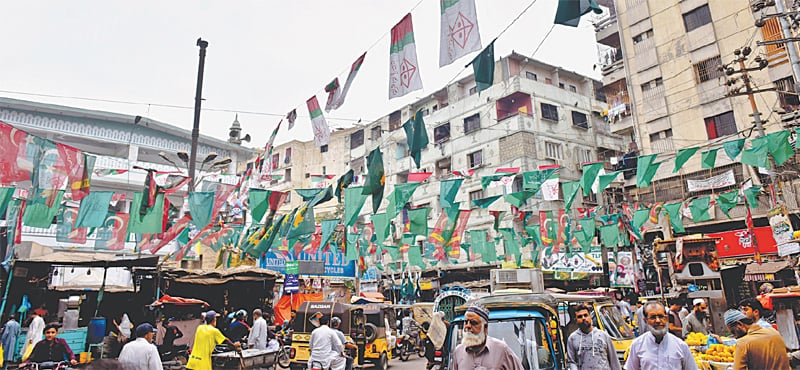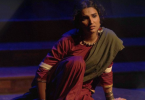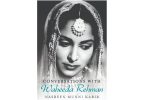Omair Alavi|Published August 19, 2018
FLAGS of various political parties flutter in the Kharadar area a few days after the general election.—White Star
KARACHI is one of those cities where people from different ethnicities come and reside in search of a better life. However, during the last few decades, the city’s political scenario has been in the news for all the wrong reasons, but in Naya Pakistan, we might see a change that comes once in a generation.
Karachi’s luck changed when a new capital was literally created out of thin air and the metropolis fell under the provincial government of Sindh. Since the 1970s, Pakistan Peoples Party is ruling the province during democratic days and one of the biggest public gatherings in the city’s history was the wedding reception of former prime minister Benazir Bhutto in the mid-80s. Then came the general elections of 1988 and ‘Dilan Teer Bijan’ was being heard everywhere mainly because Bhutto ki beti was challenging the man who had her father imprisoned. Be it Lyari, Defence, Clifton or Malir, PPP well-wishers were everywhere as they sympathised with their leader Zulfikar Ali Bhutto and his returning-from-exile daughter Benazir.
Although the Jamaat-i-Islami used to win seats from the city, the entrance of Mohajir Qaumi Movement, later dropping the ‘Mohajir’ bit for Muttahida, disturbed the opponents as the people of Karachi found resonance in the new party’s message, especially over the language issue. The party dominated the city in parts as one could hear the signature ‘Saathi’ song, as well as a few Bollywood-inspired numbers in Urdu-speaking areas and thus began the reign of Altaf Hussain. No other party had the power to challenge the ‘Bhais’ and although the Islami Jamhoori Ittehad parties (namely Pakistan Muslim League and Jamaat-i-Islami) won a few seats in the general elections, the city belonged to the MQM.
Then Karachi became a ‘war zone’ between different parties who battled over turf. Parties like the Punjabi Pakhtun Ittehad and others also highlighted the fact that Karachi was now divided along ethnic lines. However the MQM redefined the city’s structure with places like Mukka Chowk, Azizabad, Kamran Chowrangi to name a few. They won seats from the city despite PPP’s dominance in other parts of the province and that’s why when the local bodies elections occurred, MQM defeated all; Mustafa Kamal’s administration was particularly memorable.
However, a couple of years back things changed drastically as the federal government decided to show its supremacy by curbing criminal activities in Karachi and law enforcement agencies moved in to ‘deal with’ the criminal elements within all political parties. That’s one of the many reasons why during the recently held general elections, every party got a chance to freely show their muscle even though a few parties might not agree. The public gatherings were held peacefully; political parties and even independent candidates could take out rallies late into the night, no political office was destroyed by opposing parties and apart from minor incidents, things went well generally.
In fact, when Pakistan Tehreek-i-Insaf won the majority of seats from Karachi in the general elections, its supporters held a rally that originated from different parts of the city, something that was unthinkable in the past. The supporters of MQM also criticised the result, but in a civil manner and that’s exactly the beauty of Karachi. In the general elections of 2013, things were much different although many of those people who voted did so for the first time in their lives. Five years later, the situation in the city was far better and Karachi elected PTI in large numbers, followed by MQM and PPP although the losing team hasn’t acknowledged the wins graciously.
With PTI and MQM joining hands to be part of the federal government under Prime Minister Imran Khan, things look slightly better for Karachiites who hope for a new era of peace and harmony in the city in general and the country in particular.
Published in Dawn, August 19th, 2018







